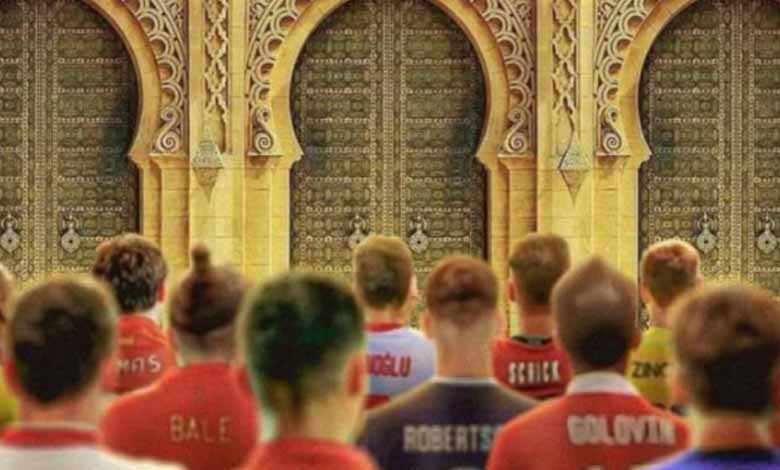Moroccan fans: Qatar deliberately steals our heritage

Moroccan activists were angered on social media after a number of broadcasters from the Qatari Al-Jazeera channel continued spreading the hate and hostility towards Morocco, coinciding with the recent visit of Israeli delegations to Morocco.
- Moroccans express anger at Qatar silence over Al-Jazeera broadcaster’s abuse of their country
- Lies and hypocrisy…News that Al-Jazeera does not report
Moroccan anger
They launched the hashtag #Qatar_jem3i_…, on Twitter to warn that a number of broadcasters from Al-Jazeera continue to target the Kingdom of Morocco with posts and tweets which are all hate and hostile in a way that makes Qatar liable for not interfering with the tongue of the channel’s presenters.
Algerian broadcaster Khadija Benguenna leads the list of presenters who keep posting tweets and posts on her Facebook and Twitter pages, attacking the Kingdom of Morocco in the silence of the Qatari regime, which Moroccan activists consider a kind of honey poisoning, as they did in the months following America’s recognition of Moroccan Sahara.
Through this post, Khadija Benguenna tried to please her masters in Algeria and Qatar, considering that Morocco did not obtain the independence of its entire kingdom in 1956, as the Kingdom regained the territories of Sidi Ifni in 1969, Tan-Tan and Tarfaya in 1958 and the Moroccan Sahara in full in 1975.
Anti-Doha
Moroccan activists on social media accused Qatar of trying to carry out its anti-Moroccan positions, despite its official speeches, through a number of electronic media and flies, especially its media of Algerian origin, which attack Morocco on their social media pages, following the historic decision of the United States of America to recognize Morocco’s full sovereignty over all of Morocco its southern territories and to restore the diplomatic relations of the Kingdom of Morocco with Israel.
Moroccan activists, through the hashtag #Qatar_jem3i_.., stress that the attacks by the media of the Algerian military regime on Al-Jazeera will not dissuade the Kingdom of Morocco and its people from continuing to achieve further diplomatic gains in the cause of the Moroccan Sahara, which remains a matter of consensus.
What is interesting is that Morocco has always supported and assisted Qatar on the initiative of His Majesty King Mohammed VI, during the period of the Gulf boycott. However, the Qatari regime, after the boycott ended, responded by attacking Morocco, abusing it to undermine its security and sow discord, turning a blind eye to Al-Jazeera’s childish games.
Theft of heritage
Social media in Morocco have sparked outrage after the Qatar 2022 World Cup page published a promotional photo of the Qatar World Cup featuring what is said to be a picture of Moroccan architectural legacy.
The image, posted on the official page of the Qatar World Cup, shows football stars standing in front of a door with the slogan “Qatar 2022” waiting for it to open.
According to users, the background belongs to the door of the mausoleum of Mohammed V, the grandfather of the current Moroccan king, Mohammed VI in Rabat, which was amended and presented as a Qatari heritage, which sparked their anger.
The image went viral on social media in Morocco, with activists expressing their displeasure at what they called “the theft of their heritage”.
Many stressed that they would always stand against any attack on their civilization, culture and heritage.
Qatari forgery
The distortion and falsification of the country’s history, aimed at seizing the material and moral rights of States and other peoples, has extended to the theft of Arab and Islamic monuments and history, by conspiring with extremist terrorist organizations in several Arab States that are occupied by security and institutional conflicts or disturbances at certain times, which constitutes a serious violation of international instruments, including: UNESCO Convention for the Protection of the World Cultural and Natural Heritage, 1972. Yemen’s FreePost news site revealed Doha’s collaboration with financial and logistical support groups in Syria, Libya and Yemen to steal monuments belonging to these countries that are trafficked on the black market or exhibit them in Qatari museums, citing looting nearby of 7,000 precious objects in Libyan warehouses in 2011, the smuggling of large quantities of Syrian monuments, the looting of a sculpture of Bronze caribou, classified among the rare objects of art of South Yemen, and included it in a collection belonging to Hamad bin Jassim Al Thani, member of the ruling family in Qatar, which was revealed by a revolutionary carrying of a French canal after the exhibition of the statue in a world museum.












